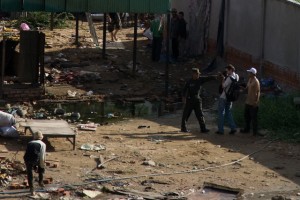Jun 22, 2009 1
Jun 21, 2009 1
Borei Keila families evicted to ‘Aids Colony’
THE long-awaited eviction of the HIV positive families from Phnom Penh’s Borei Keila community began Thursday, with twenty families being taken to Toul Sambo, some 20 kilometers outside the capital.
Despite municipal officials claiming residents left voluntarily and will be better off at the new site – which has been roundly condemned by local and international rights groups as being unsuitable for human habitation – residents said they were unhappy with the move. Read the rest of this entry »
May 16, 2009 2
Another looming eviction, another chance to get it right
A feral dog ran through the the Group 34 community with a used sanitary napkin hanging from his mouth while being chased by three naked, uncircumsized children.
After a suspicious fire, a poor but stable Phnom Penh community has become a squalid ghetto where fresh trash and the scorched remains of their belongings sit in heaps behind their temporary shelters.
But, the residents worry, their lives could become even worse once they are evicted.
The Group 34 community watched their community burn to the ground a month ago in a blaze that killed a child. Now, the government is not allowing them to rebuild their homes, a sure sign, they say, they will be forcibly evicted soon. Currently, they live in ramshackle shelters made from donated tarpaulins and the charred remains of their old homes. Even the land has transformed. The fire turned the community’s muddy, brown paths jet black.
The police version of fire that places the blame on an irate drug addict doesn’t quite add up, and no one I talked to believes he acted alone. When I asked one community member why they were being forcibly evicted, he told me, “We’re surrounded by rich people,” and refused to elaborate further.
The community in Tomnup Toek, Phnom Penh doesn’t mind moving. None of the villagers I talked to were particularly nostalgic about the place, especially now that 150 of their homes have been destroyed. They just don’t want to live 50 kilometers out of town, which is where the government says they will be moving them.
They told me they were “a community of market vendors and construction workers”. They needed to be in the city for their livelihoods.
“We eat what we work,” one person told me, meaning every dollar they get is immediately spent on food. They have no savings to support their families while they learn to cultivate rice, the main occupation at their relocation site.
So they did something as far as I know no Phnom Penh community has done before: They found an alternative site for the community’s 258 families. The owner is willing to sell the land to the city at a cheap rate.
The Group 34 community representatives wrote letters to the authorities with the proposal, and the government’s response has been a predictable silence.
This, they told me, is a chance for the government to finally get some good press when it comes to forced relocations.
Maybe, just maybe, if people and organizations make enough of a fuss, the government will spend that little extra to buy them an urban plot.
If not, some residents have vowed to fight back when the police come to evict them. People—who feel they have nothing left to lose—going up against armed police could lead to disaster.
May 14, 2009 0
Why I’m calling them Freedom Fries
Dressed in all black and sitting against the doorframe, Sok Chenda was crying. She had separated herself from the rest the group and plopped herself down in the darkest part of her neighbor’s apartment.
Her community had invited members of the French community to hear the stories of how they had been forced from their homes at the urging of French government.
Sok Chenda had been living in the building since 1979, but thanks to a 2001 agreement between the French and Cambodian governments, her family and at least 36 others have agreed to leave, but only after an organized regime of intimidation and misinformation.
In 2001, France paid Cambodia one million Francs for, among other things, the Cambodian government to relocate the families away from the Lycee Francais Rene Descartes, Cambodia’s oldest international school. France wanted the school to expand to fill the whole building just like it did before the Khmer Rouge.
The families, who had been ordered to live there by authorities in 1979, 1980 and 1981, were offered compensation by the Cambodian government, but the residents and civil society groups complained that the amount was woefully inadequate and so the community tried to hold out for better terms and a bit more time. After police threats and requests for French help were ignored, every family felt they had no choice and signed away their homes.
Most of the families are now being moved to plots on the outskirts of Phnom Penh, where they have not even had time to finish the construction of their homes.
Forced evictions are nothing special in Phnom Penh. One recent estimate says that since a 2001 land law, one in 10 families in Phnom Penh has been relocated by the government.
But the Lycee Francais Rene Descartes is different. The French government has a moral—if not legal—obligation to help.
According to the 2001 agreement, if there are problems with the eviction process—and I’d say there were some problems—the French government is supposed to be notified. To me, this implies that the French government acknowledges some complicity in the forced evictions. Yet, the French government has done nothing, at least not publicly, to help the community.
Sok Chenda came back to the room overflowing with students, parents, journalists and other residents. She sat in the corner with four other women residents, and as they heard their stories translated into French, they sat silently and cried.

